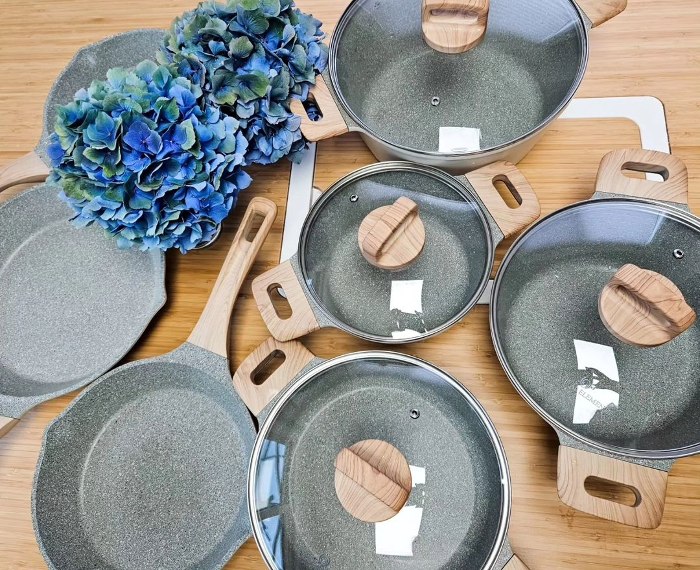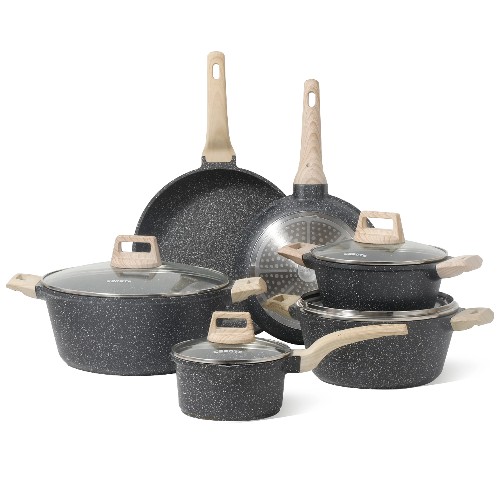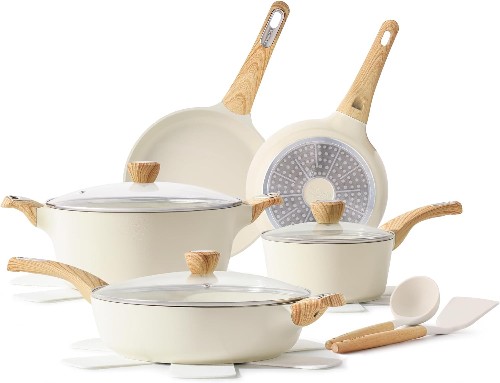Granite vs. Ceramic Cookware: Which is Right for Your Kitchen?
In the world of cooking, selecting the right cookware can significantly impact your culinary endeavors. Two popular options that often stand out in kitchens are granite and ceramic cookware.
Both offer unique features and benefits, making the choice between them a matter of personal preference and specific cooking needs. In this article, we’ll delve into the characteristics, pros, and cons of granite and ceramic cookware to help you make an informed decision for your kitchen.

Granite Cookware:
Granite cookware, also known as granite stone cookware, features a surface infused with particles of granite to enhance its durability and non-stick properties. Here are some key points to consider:
1. Durability: Granite cookware tends to be highly durable, thanks to the infusion of granite particles. This makes it resistant to scratches, dents, and general wear and tear, ensuring longevity in your kitchen.
2. Non-Stick Properties: The granite particles embedded in the cookware surface provide a natural non-stick coating, reducing the need for excessive oil or butter during cooking. This makes it an excellent choice for health-conscious cooks looking to reduce added fats in their meals.
3. Heat Distribution: Granite cookware typically distributes heat evenly across the cooking surface, helping to prevent hot spots and ensuring uniform cooking of food.
4. Cleaning and Maintenance: Granite cookware is often dishwasher safe, which makes cleaning a breeze. However, some manufacturers recommend handwashing to prolong the lifespan of the non-stick coating.
5. Price: While prices can vary depending on the brand and quality, granite cookware is generally affordable compared to some other high-end cookware options.
Recommended Granite Cookware Set: CAROTE 12Pcs Pots and Pans Non Stick Granite Cooking Set

Ceramic Cookware:
Ceramic cookware is made from clay that is hardened by firing at high temperatures. It is then coated with a ceramic glaze to create a non-stick surface. Here’s what you need to know about ceramic cookware:
1. Non-Toxic: Ceramic cookware is prized for being free of harmful chemicals such as PFOA and PTFE, making it a safe option for cooking.
2. Versatility: Ceramic cookware is suitable for use on various cooking surfaces, including gas, electric, and induction cooktops. It can also be used in the oven, providing versatility for different cooking methods.
3. Non-Stick Properties: Like granite cookware, ceramic cookware boasts a non-stick surface that facilitates easy release of food and simple cleanup.
4. Heat Retention: Ceramic cookware tends to retain heat well, allowing for efficient cooking at lower temperatures and saving energy in the process.
5. Fragility: While ceramic cookware is durable, it can be prone to chipping or cracking if dropped or mishandled. Careful storage and handling are necessary to prevent damage.
Recommended Granite Cookware Set: SENSARTE Ceramic Pots and Pans Set
Conclusion:
Both granite and ceramic cookware offer distinct advantages for home cooks, and the choice between them ultimately depends on individual preferences and cooking habits. Granite cookware excels in durability and heat distribution, while ceramic cookware is prized for its non-toxic nature and versatility.

Consider factors such as cooking style, budget, and maintenance preferences when selecting the right cookware for your kitchen. Whether you opt for the rugged durability of granite or the natural non-stick properties of ceramic, investing in high-quality cookware can enhance your culinary experiences for years to come.
